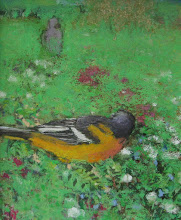blizzard
We are in the thick of winter. A lot of winter is past, but winter will only slowly crawl toward spring, through many weeks. We almost forget the shapes of trees or where the long yard meets the fields. Some days we cannot see much of any detail, winter so thick around us.
My small pastel painting here only seemed OK (OK, it's done) when it became almost detail-less. It did not breathe or shake or otherwise move for quite awhile, for many layers until then. I did not set out to paint such an abstract view. Still, this is the place where the painting has stopped, where the evergreen on the right emerges or dissolves in the midst of winter all around.
I wonder where the word "blizzard" comes from.

















